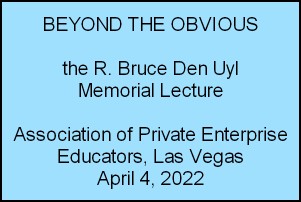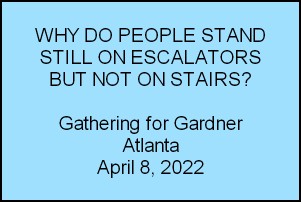
A couple of weeks ago, I was in Las Vegas for the annual meeting of the Association for Private Enterprise Education, where I was honored to give an invited plenary address.
From there, I went directly to Atlanta, where I gave a short talk at the Gathering for Gardner, honoring the legacy of Martin Gardner. There were a lot of other really cool talks too.
I am sorry that the Las Vegas talk was not recorded and that the recording from the Atlanta talk won’t be available for a few months. Therefore I sat down in front of my webcam and repeated both talks, sticking as close to the original words as my memory would allow. Unfortunately there is no way to recreate the audience reaction or the question and answer periods.
Click below to view either or both of those re-creations.

|

|
The second talk is essentially a six-minute excerpt from the first. It surely benefited from the discussions here, here and here, and most especially from the comments of Bennett Haselton.
A few more words about escalators for those who care about this kind of thing:
Continue reading ‘Where I’ve Been’

